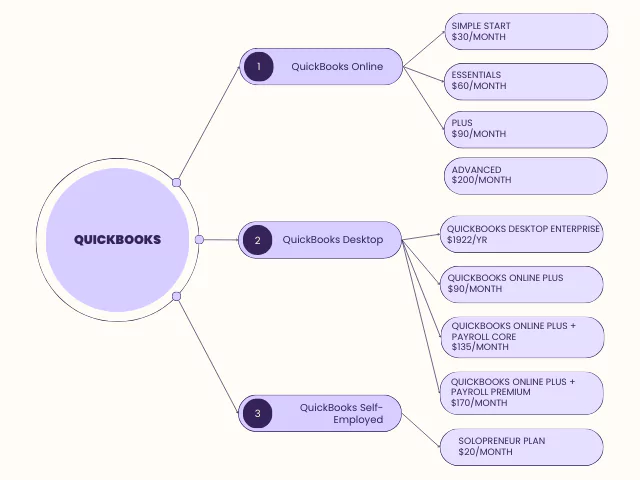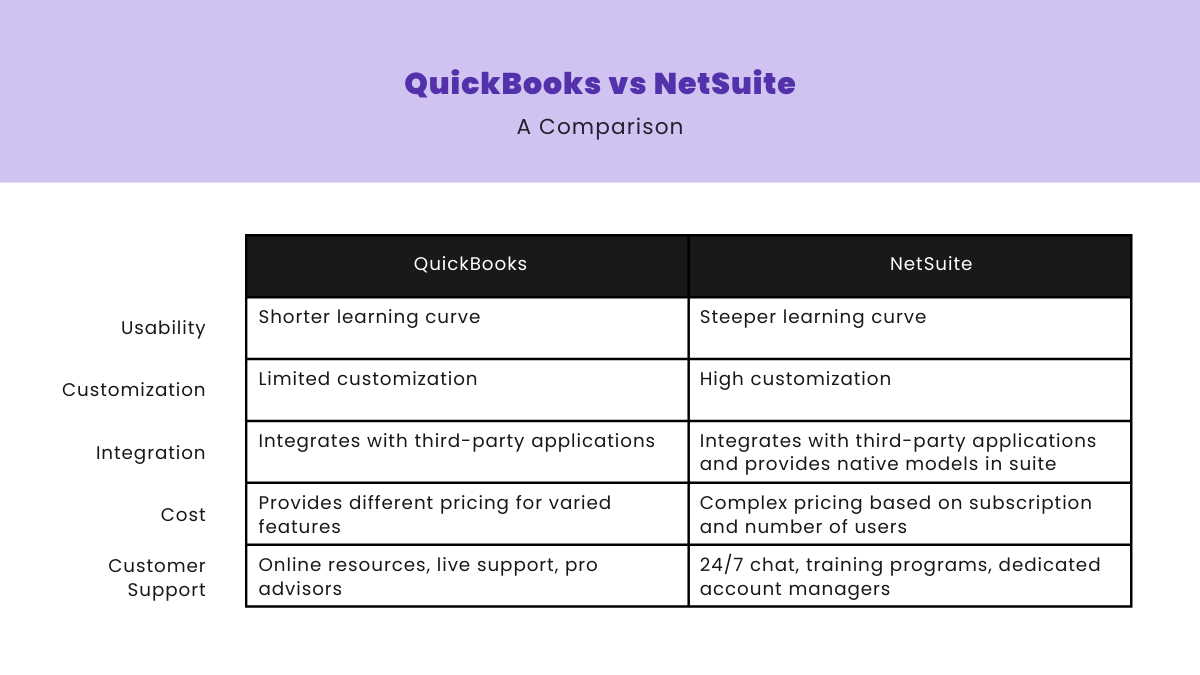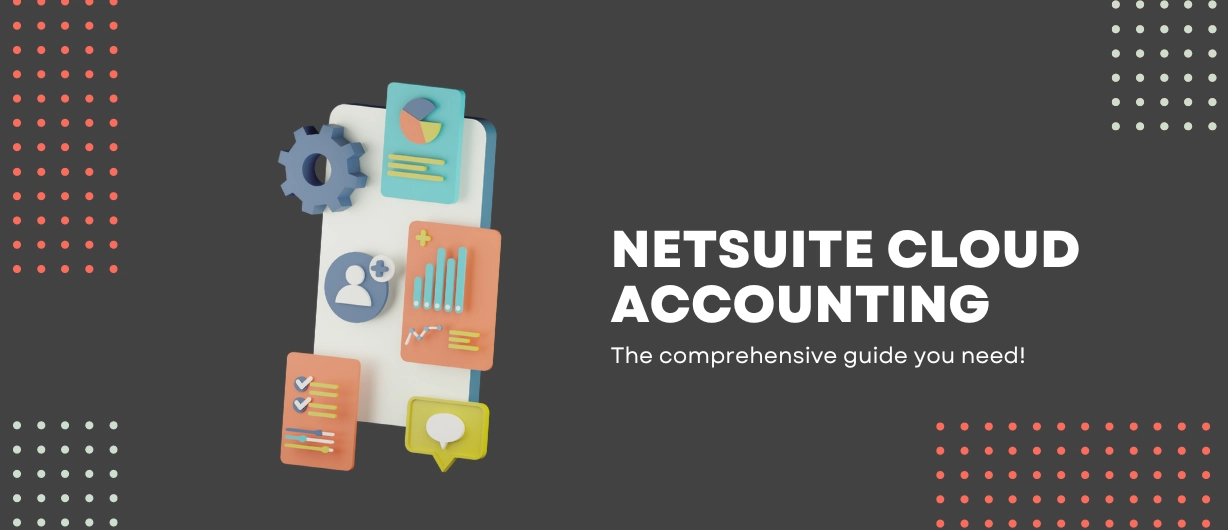June 14 2024 | By Farwah Jafri | 9 minutes Read

Let’s Get to the Basics
QuickBooks
Key QuickBooks Features You Can Enjoy
NetSuite
NetSuite vs Quickbooks Cost
Key Features
QuickBooks vs NetSuite: A Comparison
Customer Support: NetSuite vs QuickBooks
QuickBooks Support
NetSuite Support
Which One Is Right for Your Business?
When to Choose QuickBooks
When to Choose NetSuite
Final Thoughts
Frequently Asked Questions
It can be quite hard to trust software to do all your accounting for you right off the bat. All new additions to your workflow take some time to get used to, and accounting software is no exception. Navigating the QuickBooks vs NetSuite debate can feel an awful lot like being caught in a maze. With the varying opinions available, what’s the best route?
How do you know which one is the best fit for your needs? Today, we are diving right in and exploring everything you need to know about QuickBooks and NetSuite before you make a decision. We’ll cover everything, from features and usability to pricing and support, ensuring you understand both platforms before you are done exploring this article.
Before we pit both the software against each other and start heading into a detailed comparison, let’s hash out some of the backstory as well as the functionalities for both the software and how they can be useful to you!
Quickbooks, developed by Intuit, has long been a favorite among small—and medium-sized businesses. Its user-friendly interface and diverse features make it extremely easy for a beginner to learn and use the software without much external help.
QuickBooks is divided into several versions, including QuickBooks Online, QuickBooks Desktop, and QuickBooks Self-Employed. Each caters to differing business needs and customer profiles.

*The prices are subject to changes as per QuickBooks terms and conditions. Monthly and annual discounts and offers can lead to fluctuations in pricing.
Quickbooks is quite easy to use. In fact, that is exactly what the software is known for. Its intuitive interface makes it quite easy to access, even for those with limited accounting knowledge.
NetSuite, an Oracle product, is an all-in-one business management suite that typically caters to much larger enterprises. Unlike QuickBooks, NetSuite offers a full range of ERP (Enterprise Resource Planning) features that bring financial management, CRM, and e-commerce capabilities onto one platform. This makes it quite a powerful tool for businesses on the lookout for an all-encompassing solution.
NetSuite’s pricing is not as straightforward as QuickBooks. It operates on a subscription model with costs based on the number of users and the modules required. Prices can vary significantly, but a typical small to mid-sized business might spend anywhere from $999 to $3,000 per month. It’s important to note that implementation costs for NetSuite can also be substantial, sometimes reaching tens of thousands of dollars.
There’s no straight answer to the NetSuite vs QuickBooks cost conundrum. It is essential to reach out and communicate your business’s requirements carefully and get a pricing plan before making the comparison!
NetSuite is known for its scalability. It can grow with your business, even if your business grows beyond a certain size. This means it is suitable for both small and large firms. Moreover, NetSuite provides an all-inclusive ERP system that allows you to manage your financials, CRM, inventory, and e-commerce within a single platform.
You can also adjust the features to meet specific business needs and requirements, as well as explore some advanced customization abilities. NetSuite also includes global capabilities so you can handle multi-currency transactions with ease, deal with international tax regulations, as well as use multiple languages.
Like QuickBooks, NetSuite also allows you to explore advanced reporting tools to make data-driven decisions.

When engaging in a QuickBooks vs NetSuite comparison, it is vital to understand how their features stack up against each other. Here’s a closer look at some aspects:
Usability
Customization
Integration
Reliable customer support is crucial when dealing with complex accounting software. Here’s how QuickBooks and NetSuite fare in this department:
QuickBooks offers several support options, including:
NetSuite provides all-encompassing support services, including:
Deciding between QuickBooks vs NetSuite ultimately depends on your business needs, budget, and growth plans. Here are some scenarios to help you decide:
In the QuickBooks vs NetSuite debate, there is no one-size-fits-all answer. Both platforms offer distinct advantages, and the right choice depends on your specific business requirements.
QuickBooks shines with its ease of use and affordability, making it a favorite among small to mid-sized businesses. On the other hand, NetSuite’s comprehensive ERP capabilities and scalability make it the preferred choice for growing enterprises and global operations.
Whether you choose QuickBooks or NetSuite, investing in the right accounting software is crucial to ensuring your business’s financial health and success. Take the time to assess your needs, budget, and long-term goals to make the best decision for your company.
1. QuickBooks vs NetSuite; which is better for small businesses?
For small businesses, QuickBooks is generally the better choice. Its user-friendly interface, affordability, and essential accounting features make it ideal for smaller operations with simpler needs.
2. Can NetSuite handle large enterprises and complex operations?
Yes, NetSuite is designed to handle large enterprises and complex operations. Its scalability, comprehensive ERP features, and global capabilities suit businesses with advanced needs and significant growth potential.
3. What are the main differences between NetSuite vs QuickBooks Online?
NetSuite is a full ERP system offering many business management tools, while QuickBooks Online focuses primarily on accounting and financial management. NetSuite suits larger businesses with complex needs, while QuickBooks Online is ideal for small to mid-sized businesses. So if you are confused between NetSuite vs QuickBooks Online, evaluate your business size first!
4. How does the cost of NetSuite compare to QuickBooks?
NetSuite tends to be more expensive than QuickBooks. While QuickBooks offers affordable monthly subscriptions starting at $25, NetSuite’s pricing can range from $999 to $3,000 per month, plus implementation costs. NetSuite’s higher cost is justified by its extensive features and scalability.
5. Is there a free trial available for QuickBooks or NetSuite?
QuickBooks offers a 30-day free trial for its online versions, allowing users to test the software before committing. NetSuite does not typically offer a free trial, but potential customers can request a demo to see the software in action.
6. Can QuickBooks and NetSuite integrate with other business tools?
Yes, both QuickBooks and NetSuite offer extensive integration capabilities. QuickBooks integrates with numerous third-party applications, while NetSuite provides native modules and integration options to connect with various business tools.
7. How long does it take to implement NetSuite compared to QuickBooks?
QuickBooks can be set up quickly, often within a day, allowing businesses to use it almost immediately. On the other hand, NetSuite has a more complex implementation process that can take several weeks to months, depending on the customization and scale of the deployment.
8. Which software offers better customer support, QuickBooks or NetSuite?
Both QuickBooks and NetSuite offer robust customer support, but the level of support can vary. QuickBooks provides online resources, live support, and access to ProAdvisors, while NetSuite offers 24/7 support for premium subscribers, extensive training programs, and dedicated account managers for larger accounts.
9. Are there industry-specific versions of QuickBooks or NetSuite?
QuickBooks offers industry-specific versions for businesses like retail, manufacturing, and nonprofits. NetSuite also provides specified solutions for various industries, including software, wholesale distribution, manufacturing, and professional services, making both platforms ideal for different business types.
10. Can I switch from QuickBooks to NetSuite as my business grows?
Yes, many businesses start with QuickBooks and later transition to NetSuite as they grow and their needs become more complex. Both platforms offer tools and support to facilitate data migration and ensure a smooth transition.
If you are thinking of transitioning to NetSuite or want to start using accounting software for the first time, now is the time to act! Monily’s financial experts can make the transition easy for you, with our cleanup and catchup bookkeeping services and accountants who know what they are doing. Book a free consultation today and learn all about it!
Subscribe for business tips, tax updates, financial fundamentals and more.
MORE BLOGS

Running a startup or a small business is all about making smart decisions, especially when it comes to spending money. Every dollar counts and before investing […]
Learn More →
Understanding the varying types of tax forms can leave even expert accountants scratching their heads. Two of the documents that confuse many businesspeople are the W2 […]
Learn More →
We already detailed in a previous blog here, what NetSuite is all about. In short, it is a cloud-based suite of management tools that, on a […]
Learn More →